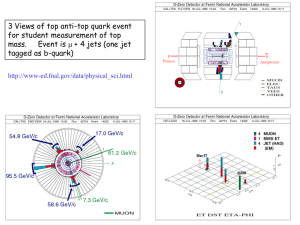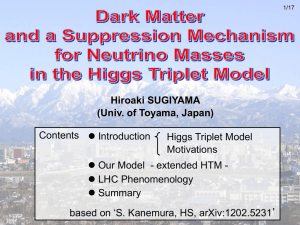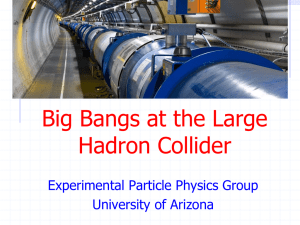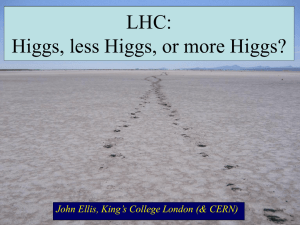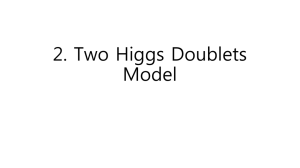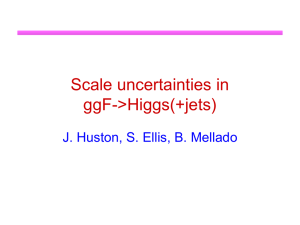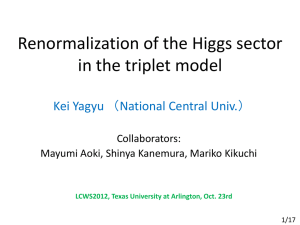Higgs in SUSY
advertisement
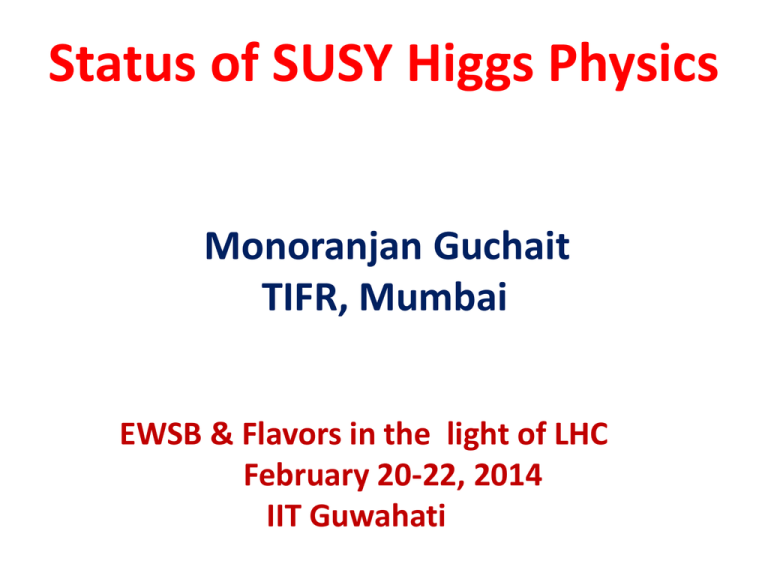
Status of SUSY Higgs Physics Monoranjan Guchait TIFR, Mumbai EWSB & Flavors in the light of LHC February 20-22, 2014 IIT Guwahati My sincere apology If I miss your work and references Outline Higgs discovery. Higgs in Supersymmetry and related Phenomenology. Higgs in non-minimal model Discovery of Higgs Signal observed above the background about 4.7σ level Talk by Manas Higgs Properties i [ j h Br(h i)]observed [ j h Br(h i)] μ=0.80 ±0.14 ̴ 20% uncertainty. With updgraded LHC, this can come down to 8-10% Spin 0+ is favored What it is? Couplings to WW, ZZ and γγ are as expected in SM. Couplings are proportional to Masses as predicted by Higgs mechanism. Hence, it is a “125 GeV Boson/new state”…. But it is a Higgs Boson Is it “the SM Higgs Boson” or “a Higgs boson” from some other model..or something else.. Higgs is discovered But…. No evidence of any New Physics …..raising many uncomfortable questions Higgs and New Physics But a very serious implications are there for BSM Data is compatible with SM , but sensitivity is 1520% can constrain BSM. Some models are already “closed”: Higgsless model, fermiophobic, gauge phobic, fourth generation, extreme technicolour.. Some models are under tension, many other extension of Higgs model, private, portal light technicolor Some models are very much constrained…. Is SM can be regarded as Theory of everything? Is the SM a complete theory? Most probably answer is NO. Many issues(Th+Exp) need to understand, Hierarchy problem.. Neutrino mass, Origin of DM ……………… Beyond SM Supersymmetry and many of its variations Extra dimension, Kaluza Klein, Composite Higgs Little Higgs, Littlest Higgs …………………. Higgs and Supersymmetry Implication in SUSY Stabilization of Higgs mass, Hierarchy problem, m(Higgs)<<M(planck) | f | B The MSSM: particle content + 2 Higgs doublets Supersymmetry is not an exact symmetry 100+ parameters Higgs Sector in SUSY Higgs Masses Higgs masses are calculable: M A , tan tan vu vd 5 Higgsses: h, H , A, H At tree level, lightest Higgs mass : Lightest Higgs mass at 1-loop Stop masses play an important role, connected with the Higgs Stop Sector Stop mixing matrix in ~ ~ the basis : tL, tR X t A t cot ~ ~ ~ ~ tL , tR t1 , t2 Lightest Higgs masses M M cos 2 M 2 h 2 Z 2 2 h X t 0( 6M S ) No(Maximal) mixing At 1-loop correction , ̴ 20-25 GeV for stop masses < 1 TeV and no mixing scenario Upper bound on lightest Higgs Mass M M cos 2 M 2 h For MSUSY ̴ 1 TeV. 2 Z 2 2 h M h 135 GeV An upper bound of 135 GeV of lightest higgs can be achieved M Very strong prediction Higgs Masses Implications A Higgs of mass 125 ±2 GeV is observed. •What are the implications In SUSY models? •What happens to the Higgs sector? What are the implications of Higgs discovery in other particle searches, in particular stop searches? Lightest Higgs mass and stop sector Maximal mixing is favored, otherwise, requires heavy stop Hall et. al ,12 Lightest Higgs mass and stop sector In pMSSM Large MS values with moderate mixings and high tanβ are preferred Djouadi et. al ‘12 Prediction for stops • For large mixing, stop masses are within the reach of LHC and if it found, then this form of MSSM may be valid. • If LHC does not find stop, need to think some other form of SUSY models. Stop searches at the LHC Stop mass ̴ 500-600 GeV excluded depending on LSP mass. Improved calculation of Higgs mass Codes SoftSUSy, Spheno, and SusPect calculates the Higgs mass full One loop + dominant 2 loop contributions from top/stop loops Allanach, et. Al., Porod et. Al, Djouadi et. A Recent calculation taking leading Three loops using DR or a hybrid renormalization scheme for stop sector where is the numerical evaluation Depends on various SUSY hierarchies. Harlander et. Al. FeynHiggs version 2.10 full one loop + two loop leading and subleading contribution + resummation of leading and next to leading contributions Improved calculation of Higgs Mass Heinemeyer et. al. 1312.4937 Impact on Models O. Buchmuller, et. al 1312.5233 MA-tanβ exclusion MH-mod scenario •mh-max scenario was designed to get large Higgs mass , with sparticle masses set to > 1 TeV. •Now, with the present Higgs mass, relaxing mh-max scenario, possible to obtain desired Higgs mass Mh-mod scenario:MA-tanβ exclusion MSSM: Charged Higgs Beyond MSSM In MSSM, getting the correct Higgs mass is not so trivial. Need higher SUSY scales, fine tuning which is not very interesting from phenomenological point of view. May be LHC data give hints to go beyond MSSM, (M+1) SSM= NMSSM μ-problem In MSSM: W H u H d .... If μ is generated dynamically, can be controlled. NMSSM Model The superpotential, 1 3 W SH u H d S .... 3 1 2 2 3 Vsoft ms | S | A SH u .H d A S .... 3 , : dimensionless Four new parameters : A , A : dimension full ̴ MSUSY Some additional terms are not considered in general MSSM, like tadpole terms etc. NMSSM: Higgs Potential Tree level Higgs potantial: With: Higgs spectrum Mass terms : 7 Higgsses H CP even: H1 , H 2 , H 3 CP odd: A , A 1 2 Singlet like , , A , A , eff , M A , tan NMSSM: μ problem A vev <S> of S, of the order of the weak or SUSY breaking scale generates μ-term with eff S It solves mu problem. Phenomenological constrained , lighter chargino > 100 GeV, eff 100GeV S 100GeV / Lightest Higgs Mass The lightest Higgs mass:, the SM like , largest coupling with the gauge boson, M M cos 2 v sin 2 2 h 2 Z 2 2 2 2 Contribution due to the singlet int For large values of λ, and for small tanβ, the second term grows, possible to achieve larger Higgs mass at tree level. For λ ̴ 0.7 – 0.8, Higgs mass cannot be raised above 125 GeV at tree level. To recover 125 GeV Higgs mass, we need, another ̴ 25 GeV contribution to the tree level mass. Higgs Mass at one loop M M cos 2 v sin 2 corr 2 h 2 Z 2 2 2 2 Loop level contribution make Higgs mass favorable value Lightest Higgs Mass Mt=178 GeV MSSM Mt=178 GeV Mt=171.4 GeV MSSM Mt=171 GeV Ellwanger and Hugonie, ‘06 All Higgs Masses Lightest Higgs Mass SM like Tree level mass L. Hall et. al. ‘11 Higgs Mixings Mixing of CP odd Higgs A2 cos A Sin A P1 A sin cos P A A 2 1 P2 is singlet like , If MA is large, mixing is small, A1 is completely singlet like A2 has finite singlet component. And for CP even Higgs, H i Oij S j Oij is a diagnolizing matrices and also determine couplings., it controls Couplings. SUM RULES g ZZH i OH i S2 g ZAH OHi S1 Sin A g ZA 2 H i OHi S1 Cos A Higgs couplings •The treel level couplings between charged Higgs and fermions/gauge bosons sams as MSSM •Couplings A1,2 to SM particles are same as MSSM, but multiplied by a dilution factors, related with mixings •Coulings for h1 and SM particle can be read off by replacing Cosα and sinβ by the i-th eigen vector of diagonalizing matrices. •A pure singlet SU(2) components has valising couplings with fermions and gauge bosons, then it is difficult to search those higgs masses at the the collider. ZZH reduced couplings Non observation of Higgs in LEP e e Z ZH i g ZZH i i 2 i 1 Light CP scalars are not ruled out by LEP, because of reduced couplings. For ξ ̴ 0, the H1 is difficult to produce, H2 is sensitive to Higgs searches, possibility of another lighter Higgs to exist. NMSSM Higgs in in B-Factory Prasad, Bipul, Poulose, 12 A1 2 NMSSM Higgs at the LHC h a1a1 4 Higgs production at the LHC Signal depend on the standard higgs discovery modes NMSSM Higgs at the LHC Higgs discovery is same as MSSM channels, but sensitivity depends on the doublet-singlet mixings. Interestingly, higgs to higgs decays, h→AA decays give rich phenomenology. Gunion et. Al., Poulose, Moretti et. al. , Dproy, Drees, MG, …. If lighter state , possibly below LEP limits, is SM like and strongly mixed, less coupling with b-quarks, enhanced decay rates In photonic channel. G. Belanger et. al ‘12, …. There are scenario where the SM like state is H2 and the lightest state is H1(70 – 100 GeV), singlet like. Distinguishing feature of NMSSM Outlook Discovery of 125 GeV Higgs open up new era in particle physics. Although, it is very much SM-like, possibility of other BSM are not ruled out. May be , this Higgs is the first piece of BSM, which has been discovered. In minimal Supersymmetry, it can be confirmed by discoverin sparticles, mainly lighter Stop, and non-minimal SUSY model, in addition more lighter states of Higgs are required to be discovered. A rich phenomenology and experimental program is ahead in the next generation of LHC. Thank you
